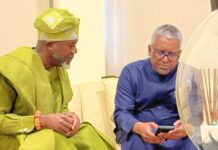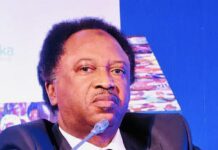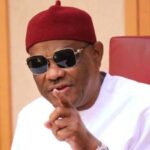Governors, ministers and former military chiefs are among notable personalities listed as witnesses by Indigenous People of Biafra (IPOB) leader Nnamdi Kanu as witnesses in his terrorism case.
The IPOB leader, whose no-case submission was dismissed by Justice James Omotosho, is due to open his defence on the trial.
Ministers Nyesom Wike (FCT), David Umahi (Works), former Army chiefs Gen. Theophilus Danjuma and Gen. Tukur Buratai are among the 23 witnesses whose names were frontloaded by the IPOB leader.
Also listed as witnesses are Imo State Governor Hope Uzodinma, Lagos State Governor Babajide Sanwo-Olu, former Abia State Governor Okezie Ikpeazu, former Attorney General of the Federation, Abubakar Malami, Director-General of the Director of State Service (DSS) Oluwatosin Ajayi, his predecessor, Yusuf Bichi, and former Director General of the National Intelligence Agency (NIA) Ahmed Rufai Abubakar.
In a document filed yesterday, which he personally signed, Kanu prayed the court to extend the six days earlier granted him to conduct his defence to 90 days.
Justice Omotosho at the last hearing, granted his request for a private meeting with his team of lawyers on October 22 in the courtroom of the Federal High Court in Abuja, preparatory for today’s commencement of his defence.
In the document, Kanu categorised his witnesses into two: “ordinary, but material defence witnesses (voluntary) and “material and vital witnesses (to be summoned under Section 232 of the Evidence Act 2011).”
The defendant also indicated his intention to testify in person.
According to the document, Kanu said he plans to call Wike “to testify on the Obigbo Massacre, following the EndSARS protests and the role of security forces under his authority.”
He said Uzodinma is “to testify on public statements, following Ahmed Gulak’s death and subsequent clarification exonerating IPOB.”
Kanu said he would be inviting Gen. Danjuma “to testify on his 2018 public warning, urging self-defence against infiltrated armed forces, contextualizing the defendant’s advocacy for self-defence.”
He said Buratai would “testify on the 2017 invasion of the defendant’s residence and the chain of command authorizing the military operation.”
Umahi is scheduled “to testify regarding the proscription of IPOB without judicial order and its consequences,” while Ikpeazu will “testify on his knowledge and administrative participation In the 2017 military invasion within Abia State.”
Kanu wants Malami “to testify on directives and authorizations connected with the defendant’s extraordinary rendition from Kenya in June 2021.”
Also, Ajayi is being invited “to clarify on his pubic lectures and statements on terrorists and invaders, relevant to interpreting the defendant’s own broadcasts.”
Kanu said Bichi should “testify on knowledge and authorization of rendition operations, custody conditions, and compliance with legal procedures.”
He said Abubakar is expected” to testify on the operational and diplomatic coordination of the rendition.”
Kanu said a DSS official, whose name he failed to disclose, will be invited “to be cross-examined regarding direct involvement in the defendant’s abduction and illegal transfer, fabrication of witness statements, and custodial abuses.”
Those he listed as ordinary witnesses include Chief Emeka Umeagbalasi, who he described as an “expert in political history and self-determination.”
According to the document, Umeagbalasi “will testify on the historical and legal context of self-determination movements (such as IPOB) and their treatment under Nigerian and international law, including extra-judicial killings of the defendant’s associates.”
Mazi Benjamin Madubugwu, an”associate of the defendant and former co-accused” is expected to “testify to the internal structure and objectives of IPOB, refuting claims that it is a terrorist organization.”
Chief Dan Ulasi, a community leader in Umuahia, Abia State, is being invited to “testify on the perception of the defendant’s broadcasts as political commentary rather than incitement.”
Bruce Fein, described as an international human rights and constitutional lawyer, based in Washington, D.C., United States, would “testify on the illegality of the defendant’s extraordinary rendition and its implications for jurisdiction and fair trial.”
Emeritus Professor Martin Aghaji, who Kanu said is his “treating physician,” is to “testify on the defendant’s medical condition, effects of detention, and fitness to stand trial.”
Barry Sutton, a “digital-security expert at the Massachussets Institute of Technology, Massachussets MA, USA, would “examine the integrity of the electronic evidence, including chain of custody, authenticity, and tampering issues.”
Chief Godwin I. Chionye, described as a “senior lawyer and community elder” from Isiama Afaraukwu Ibeku Umuahia, Abia State, is to “testify on the defendant’s good character and standing in his community.”
Prince Emmanuel Kanu of No. 1 Eze Okwu-Kanu Close, Umuahia, Abia State, described as an “eyewitness to the 2017 military invasion of the defendant’s residence,” is expected to “testify to the events, casualties, and use of excessive force by the army.”
Kanu said he will, in his testimony, provide “a sworn account of the facts, denying the allegations, and explaining the political context of his statements and actions.”
Part of the document reads: “Notice of number and names of witnesses to be called by the defendant and request for witness summons/subpoena and the variation of the time within which to defend the counts/charges against the defendant.
“Take notice that pursuant to the order of this honourable court made on the 16th day of October 2025, directing the defendant to commence his defence on the 24th day of October 2025, the defendant shall call a total of twenty three (23) witnesses, divided into two categories, viz:
*Category A – ordinary, but material defence witnesses (voluntary).
*Category B – vital and compellable witnesses (to be summoned under Section 232 of the Evidence Act, 2011).
“Given the materiality of the prospective evidence of the witnesses slated for the defence of the defendant, the time frame within which the defendant is ordered to present and conduct defence of the charges appears grossly inadequate, hence your lordship is urged to vary the timeframe and accommodate at least a period of 90 days for the defence.
“The Registrar of the of the court be ordered to issue subpoenas or witness summons on Category B witnesses or be permitted
“The defendant respectfully prays this honourable court to issue all necessary summonses and witness warrants under Sections 241-242 of the Evidence Act, 2011 and under the inherent jurisdiction
“The defendant undertakes to provide the sworn statements of all voluntary witnesses to this honourable court and to notify the prosecution within a reasonable time.
“The honourable court to note that the appearance of these witnesses is essential to ensuring a fair and complete determination of the issues before the court and the honourable court and the entirety of Nigeria will enjoy the robust evidence that would surface.
“No precious time of the honourable court would be delayed and it would interest the honourable court and the general public that justice is not only done but manifestly seen to have been done.”


























